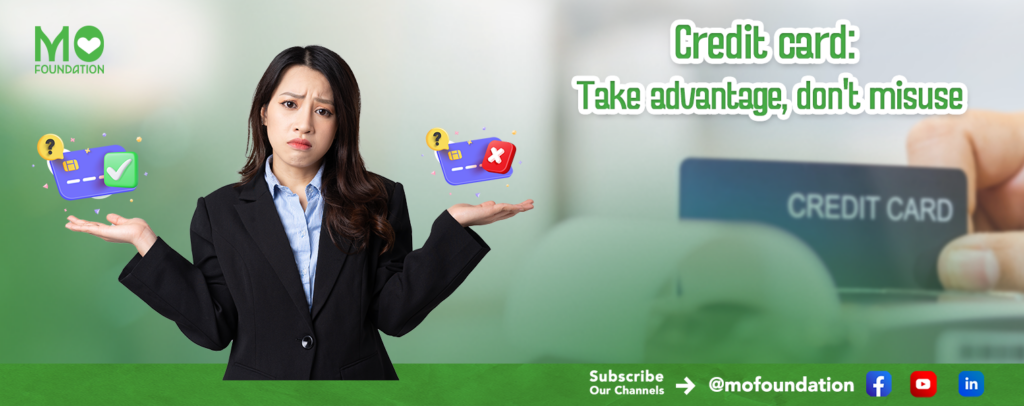
In today’s modern society, Credit Cards have become an integral part of our financial lives. They offer convenience, security, and the ability to make purchases even when we don’t have cash on hand. However, many of us, especially younger ones, started to form with little cautious attitude towards them. It’s crucial to use credit cards responsibly to avoid falling into the trap of debt. This could eventually lead to more pressure and overall impact to your long-term financial goals. This article aims to shed light on the importance of taking advantage of credit cards while also emphasizing on the potential pitfalls which can ruin your financial life.
- The Benefits of Credit Cards
Credit cards come with a range of benefits that can enhance your financial lifestyle. Some of the advantages include:
- Convenience: Credit cards offer a convenient payment method, allowing you to make purchases online, over the phone, or in-store without carrying cash.
- Safety: Credit cards provide a layer of security by protecting you against fake transactions. In case of unauthorized charges, you can dispute them and prevent financial losses.
- Rewards and Perks: Many credit cards offer rewards programs that allow you to earn cashback, travel points, or other benefits. These rewards can be a valuable way to save money or enjoy exclusive privileges like free air tickets for your short vacations.
- Building Credit History: Responsible credit card usage can help establish and improve your credit history, making it easier to obtain loans, mortgages, or favorable interest rates in the future.
- Emergencies: When in crisis, this could be the life-saver for immediate cash to get you over the financial troubles. If you receive benefits like interest-free payments for 6 to 12 months due to your excellent credit history, this could be advantageous. Before clicking the “borrow” button, double-check all of the costs because there may be any unnoticed ones, such as processing fees. However, as we will describe in the third section below, this could also be a double-edged sword.
- The Dangers of Credit Card Debt
While credit cards offer numerous advantages, the misuse or abuse of credit can lead to financial instability and emotional burdens. Here are some potential risks associated with credit card debt:
- High Interest Rates: Credit card debt often carries high interest rates, meaning that even a small balance can quickly accumulate interest and become burdensome.
- Overspending: Credit cards may tempt individuals to spend beyond their means, leading to a cycle of debt and financial stress. Easily fall into impulse purchases as the tool is too convenient and right in front of you.
- Minimum Payments Trap: Paying only the minimum amount due each month can prolong the repayment period and result in more interest paid over time.
- Negative Credit Impact: Excessive credit card debt can negatively impact your credit score, making it difficult to secure loans or obtain favorable interest rates in the future.
- Delay to Financial Goals: Excessive credit card debt hinder your ability to achieve your long-term financial goals. When a significant amount of your income goes towards paying off credit card balances, you have less financial flexibility to save for future goals.
- Stress and Emotional Burden: You will be trapped in the cycle of paycheck-to-paycheck living, limiting your financial freedom. Dealing with an overwhelming credit card can take a toll on your mental and emotional well-being. You will be constantly worrying about making payments, receiving collection calls and emails. This could even strain relationships, impact job performance and diminish overall life satisfaction.
- Take advantage, don’t abuse:
To ensure that you take full advantage of credit cards without falling into debt, it is essential to adopt responsible credit card usage practices:
- Budgeting: Create a monthly budget and stick to it. Understand your income, expenses, and prioritize your purchases accordingly. Assign not more than 30% of your total income to credit card purchases. Know that number by heart before you swipe that card.
- Paying in Full and Make it Automated: Whenever possible, pay your credit card balance in full and automatically each month to avoid interest charges. This practice ensures you enjoy the benefits of credit cards without accumulating debt.
- Limit Your Credit Card Usage: Restrict yourself to only one credit card. Having multiple cards can increase the temptation to overspend and make it harder to manage your finances effectively.
- Monitor Your Spending: Regularly review your credit card statements to track your spending and identify any unauthorized transactions. This practice will help you stay on top of your financial situation and detect potential issues early.
- Emergency Fund: Instead of relying solely on credit cards for unexpected expenses, establish an emergency fund. Having a financial reserve will reduce the need for credit card usage in emergencies.
Conclusion:
While credit cards can offer convenience and rewards, it is crucial to approach them with caution and discipline. The potential pitfalls of credit cards, such as accumulating high-interest debt, overspending, minimum payment traps, emotional stress and many more. By using credit cards responsibly and staying within your means, you can really enjoy the benefits of them and mitigate these risks and maintain a healthy financial trajectory. Remember, the key is to exercise restraint, prioritize financial responsibility, and use credit cards as a tool rather than a pathway to financial ruin.